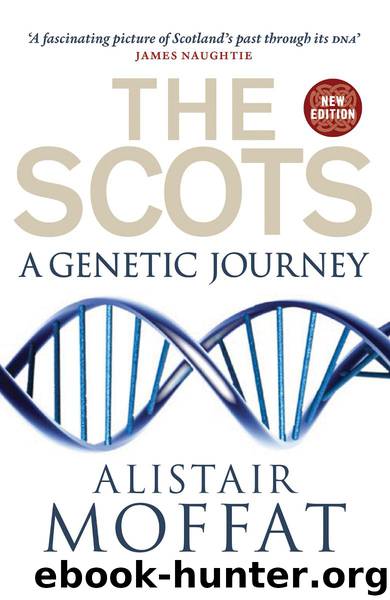The Scots by Alistair Moffat

Author:Alistair Moffat [Alistair Moffat and James F. Wilson]
Language: eng
Format: epub, azw3
ISBN: 9780857900203
Publisher: Birlinn
Published: 2011-04-17T04:00:00+00:00
By ‘Caledonia’, Tacitus meant the region of eastern Scotland north of the Tay and at least as far up as the Dee. Later evidence also places the Caledonii in the same general area. The Silures held South Wales and Gaul was of course France. What is striking about Tacitus’s observations is that they chime with both the archaeological and genetic stories. Caledonia was where the hall builders of Balbridie settled, it has a clear affinity in its DNA with the Germanic shores of the North Sea and, while red hair is much more common in Scotland than in Germany, the general cultural instincts behind the historian’s comments are well founded.
Contact between Britain and Iberia is also recognised – although again the use of hair colour as a link is dubious. Clearly, the amusing description of Britain’s climate by a shivering observer more used to Mediterranean sun is somewhat partial. But the description of the long summer days and the long summer nights shows a good deal of Roman knowledge of Scotland and the north. Earlier in his text, Tacitus notes the Roman subjugation (surely nominal) of Orkney and that their fleet circumnavigated Britain.
By the second half of the first century AD, the period dealt with in the Life of Agricola, P-Celtic had become the speech of most of Britain, including Caledonia. Gauls and Britons, especially in the south, are likely to have found each other mutually intelligible. The close contact with Rome and its advancing empire led to a good deal of borrowing. While Q-Celtic contains very few words derived from Latin, P-Celtic has many: mur for ‘wall’, ffenestr for ‘window’, gwydr for ‘glass’, cegin for ‘kitchen’, cyllel for ‘knife’, ffwrn for ‘oven’ and sebon for ‘soap’ might all be said to be characteristic of Mediterranean domesticity imported into Britain. Literacy also donated words: llyfr for ‘book’, ysgryf for ‘essay’ and awdwr for ‘author’. Even caer for ‘fort’ came from castrum and ffos for ‘ditch’ is from fossa. In all, around 600 commonly used words in Welsh come from Latin. There can be no doubt that the bulk of this substantial transfer took place during the four centuries of the Roman province but the process seems to have been underway some time before, as Rome encountered Celtic speakers in the second half of the first millennium BC.
What this brief review of language history reveals is that the oldest cultural continuity in Britain is also one of the most fragile. It survives in the mouths of the fewer than 50,000 speakers of Scottish Gaelic who use words and habits of mind not unfamiliar to those who lived in the north of Britain at the end of the second millennium BC.
Download
This site does not store any files on its server. We only index and link to content provided by other sites. Please contact the content providers to delete copyright contents if any and email us, we'll remove relevant links or contents immediately.
| Africa | Americas |
| Arctic & Antarctica | Asia |
| Australia & Oceania | Europe |
| Middle East | Russia |
| United States | World |
| Ancient Civilizations | Military |
| Historical Study & Educational Resources |
Room 212 by Kate Stewart(5124)
The Crown by Robert Lacey(4817)
Endurance: Shackleton's Incredible Voyage by Alfred Lansing(4783)
The Iron Duke by The Iron Duke(4356)
The Rape of Nanking by Iris Chang(4213)
Joan of Arc by Mary Gordon(4113)
Killing England by Bill O'Reilly(4004)
Say Nothing by Patrick Radden Keefe(3988)
I'll Give You the Sun by Jandy Nelson(3448)
Shadow of Night by Deborah Harkness(3368)
Hitler's Monsters by Eric Kurlander(3343)
Mary, Queen of Scots, and the Murder of Lord Darnley by Alison Weir(3210)
Blood and Sand by Alex Von Tunzelmann(3205)
Eleanor & Park by Rainbow Rowell(3176)
Darkest Hour by Anthony McCarten(3133)
Margaret Thatcher: The Autobiography by Thatcher Margaret(3083)
Book of Life by Deborah Harkness(2939)
Red Famine: Stalin's War on Ukraine by Anne Applebaum(2934)
The One Memory of Flora Banks by Emily Barr(2863)
